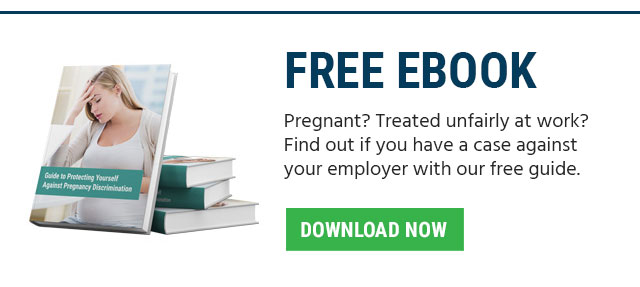Protecting You Against Pregnancy and Maternity Discrimination in the Workplace
What Is Pregnancy Discrimination?
Pregnancy discrimination can happen across industries and in all levels of a company or organization. In fact, it has been on the rise in the last several decades. In 2016, the EEOC received nearly 3,500 pregnancy discrimination charges, and between 1992 and 2007, the number of charges filed with the EEOC increased 65%.
Simply put, pregnancy employment discrimination has reached epidemic proportions with thousands of cases being reported across the United States annually.
Examples of Pregnancy Discrimination in the Workplace
Pregnancy or maternity discrimination can happen in various ways. Here are some examples:
1. Firing or Discriminating Against a Pregnant Employee
This may be blatant or more subtle. Even if an employer says they have your health in mind, that doesn’t make it right. The employer does not have the right to make decisions for you, even if the employer believes you should not be working, or should not be exposed to risks during your pregnancy. It is still illegal to fire or discriminate against a pregnant employee, even if they tell you it is in your best interest.
2. Refusing To Hire Someone Because They Are Pregnant or Have Just Given Birth
Whether this is a brand new position or if an employee is seeking a new role in a company, they can’t refuse to hire you simply because you are pregnant, may become pregnant, or recently had a baby.
3. Harassing an Employee Because They Are Pregnant
Frequent and pervasive insults, offensive jokes, and even physical threats can constitute harassment. This type of behavior can be carried out not only by supervisors but also coworkers and even customers.
4. Not Providing Reasonable Job Accommodations
An employer must provide reasonable job accommodations for someone who has pregnancy-related complications or impairments. Examples of accommodations include offering a change in schedule due to severe morning sickness or allowing an employee to have “light-duty.” The fact of being pregnant, however, does not necessarily trigger an obligation to make job accommodations. Being pregnant it is not on its own a “disability” which is what triggers the obligation to accommodate.
5. Forcing an Employee to Change Jobs
As long as an employee is able to perform her job, including reasonable job accommodations when necessary, she should not be forced to change jobs.
These are some of the most common examples of types of pregnancy discrimination. Sometimes, an individual may also be subject to maternity discrimination.
What is Maternity Discrimination?
Maternity discrimination can happen when you’re mistreated (or even fired) because you’re breastfeeding or because you’ve recently given birth. Also, if you have been retaliated against after you complained of pregnancy discrimination, you may have the right to take legal action as well.
If any of these scenarios have happened to you, you might have a case. The pregnancy discrimination lawyers at Wenzel Fenton Cabassa, P.A. can discuss your situation with you and help you understand the process of filing a discrimination case with the EEOC.
Federal Laws Protecting Your Pregnancy and Maternity Rights in the Workplace
Pregnancy Discrimination Act of 1978
The Pregnancy Discrimination Act of 1978 amended Title VII of the Civil Rights Act of 1964. The act prohibits sex discrimination on the basis of pregnancy — backed by the power of the federal government.
A Right to Fair Treatment
You have the right to be treated the same as other employees, regardless of whether you are pregnant or suffer a pregnancy or childbirth-related illness or disability. This applies to all areas of the workplace – compensation, promotions, time off, etc.
Parity with Non-Pregnancy Health Issues
Parity is all about equal rights. If you become temporarily disabled or ill due to childbirth or pregnancy, the employer must treat you in the exact same way other employees are treated who are medically disabled due to a non-pregnancy related disability. Equal treatment is mandated under the law. Please know that you may be required to support any request for accommodation (including revised duties, leave, reassignments, additional equipment) with a doctor’s note just as any other employee seeking accommodation.
American Disabilities Act (ADA) of 1990
If you become disabled due to pregnancy, you may be covered under the American Disabilities Act. The ADA is one of America’s most comprehensive pieces of civil rights legislation that prohibits discrimination and guarantees that people with disabilities have the same opportunities as everyone else.
Family and Medical Leave Act (FMLA) of 1993
Under the following conditions, you are entitled to 12 weeks off work during every 12-month period for maternity leave, childbirth, and recovery from childbirth through the Family and Medical Leave Act of 1993. (FMLA) To qualify under the FMLA, you typically would need be employed at the company at least 12 months, and have worked at least 1,250 hours within that time.
If you are wrongfully terminated or suffer a form of pregnancy discrimination like being forced to change jobs before that 12 weeks is up, you may have a case. Most businesses are required to adhere to the Family and Medical Leave Act. The FMLA says any employer with more than 50 employees (within a 75-mile radius of the worksite) is prohibited under federal law from discriminating against women on the basis of pregnancy.
Experiencing Pregnancy Discrimination? Contact an Attorney Today!
Have you experienced pregnancy discrimination in the workplace? You don’t have to go through it alone. An employment discrimination lawyer in Florida can help you fight for your rights if they have been violated at work because you are pregnant.
Contact Wenzel Fenton Cabassa, P.A. today if you feel you have been discriminated against or wrongfully terminated due to your pregnancy, and schedule your free, confidential consultation now.






